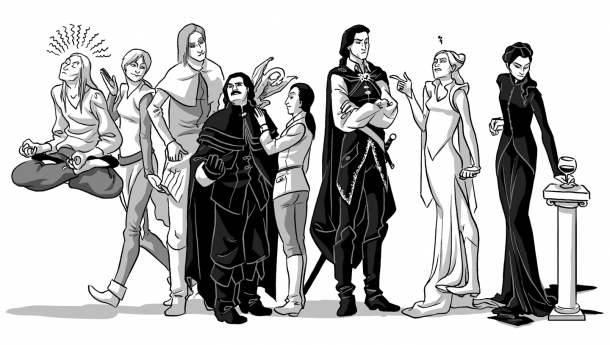Here my report, sorry for my english, who is obviously not my natural language.
Here my report, sorry for my english, who is obviously not my natural language.
First Session for me and my friend – 9:00 hours to create the characters, the crew and playing 2 missions.
My players chose the cultists crew template. They have decided to play old wandering souls who have found a way to possessed some Deathland Scavenger and found a way to trespass the Duskwall borders.
Half crazy, they think they are The Old Death God’s servants, their big project is to rebuild the gates of death and find a way to allow the souls to find the path to oblivion . They consider the souls disintegration with electroplasmic tools an error and a folly.
They have chosen as Patron Skurloc the vampire necromancer, decadent noble form Duskwall, who live in the mansion at the southern end of the Crow district.
the characters are: A Hound / a Lurk / a Whisper
First mission: after agreeing to serve the lampblack, they were send to steal a list of Bluecoats informer who have infiltrated the lampblack. They have chosen a infiltration plan into the local Bluecoats city watch station.
Highlight: when the Whisper disguised himself as a Bluecoats and diverted the attention of some guards, to give an escaping opportunity to his two fellow crew members.
Secret discovered: The cult of the “Path of Echoes” natural enemy of their faith, seems to have followers in Bluecoats and in the Red Sashes.
Second mission : Skurloc who lost control on the Crow since Roric death, asks the PCs to infiltrate Crow’s headquarters and put three Spy Ward to allow him to spy Lyssa and her minions.
The PC succeed in placing a ward at the HQ Gateway, in the meeting room and in Lyssa’s chamber.
Highlight: the Lurk who uses his Silence vial in front of Lyssa’s door, which allowed the Hound to blow its lock with his gun and shoulder ( in total magical silence), then the Whisper to put his ward while Lyssa was sleeping in the same room.
Secret discovered: Lyssa is currently recruiting from the Skovlander refuges to rebuild her gang, in exchange she close her eyes on their political scheming and uprising project against the governor in place.
the systems have worked fine for me and my players, it does very well what it is supposed to do. I tried to roll separately for the first mission, and roll in the same time the action and effect dice for the second mission. And it is clearly better to reduce the numbers of rolls.
I had a problem with the way to manage trauma. All my players took 1 trauma point during the session. It happened during a mission and I do not know how to handle this. Does the PC have to”disappear” from the mission or continue, having just lost “1 life”. It was hard to put a PC out of play when the full team was still in an enemy building.

